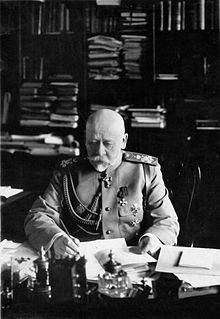Vladimir Alexandrovich Sukhomlinov
Vladimir Sukhomlinov ( Russian Владимир Александрович Сухомлинов ., Scientific transliteration Vladimir Aleksandrovich Suchomlinov; born August 4, jul. / 16th August 1848 greg. In Kaunas , † 2 February 1926 in Berlin ) was cavalry general in the Russian army and minister of war .
Life
Sukhomlinov graduated from the Nikolayevskoye Cavalry School in St. Petersburg in 1867 and was accepted into the Leib- Uhlan Regiment . In 1874 he graduated from the Academy of the General Staff. In the Russo-Turkish War of 1877/78 he served on the staff of Grand Duke Nikolai Nikolajewitsch (the elder). From 1878 he taught at the Academy of the General Staff. In 1884 he became the commander of the Pavlograd Leibdragonerregiment and headed the cavalry officers' school in St. Petersburg from 1886 to 1897. 1897 Commander of the 10th Cavalry Division. In 1899 he became Chief of Staff under Mikhail Dragomirov , Deputy Commander in 1902 and Commander of the Kiev Military District in 1904. In December 1908 he was appointed Chief of the General Staff and in March 1909 took over the post of Minister of War from Alexander Roediger . During his tenure, the Air Corps was set up and a military counterintelligence set up. Domestically, there was a constant rivalry between Sukhomlinov and the Minister of Finance and Prime Minister Kokovtsov over the financing of the army. During his tenure as Minister of War, the Russian war plans were switched to a confrontation with Germany as the main enemy. Suchomlinov's plans of 1910, contrary to France's demands, provided for the Russian armies to be set up in the hinterland and not near the western borders with Germany and Austria-Hungary.
Suchomlinov took a very conservative military-strategic position and believed that the methods of war had not changed since the time of the Russo-Ottoman War . In 1914 he allegedly boasted that he had not read a military journal for over 25 years.
First World War
During the July crisis in 1914, he assured Tsar Nicholas II that the Russian army was adequately prepared for a simultaneous war against Germany and Austria-Hungary . After the beginning of the First World War and the German defense against the Russian offensive in East Prussia in 1914 , it turned out that this was by no means the case. Sukhomlinov was accused of having misjudged the length of the war and the need for ammunition, neglecting the provisions for sufficient supplies and thereby being responsible for the failure of the 1915 spring offensive. After massive pressure on the Tsar from army circles and from Commander-in-Chief Grand Duke Nikolai Nikolajewitsch, this led to his dismissal as Minister of War in June 1915. Alexei Polivanov was his successor .
He was temporarily detained in July after some of his former associates, including Colonel Sergei Myasoyedov , were convicted of espionage for Germany. That same month, the Duma voted by a large majority to open a formal investigation into Sukhomlinov on charges of negligent conduct and possible treason. In March 1916, the Tsar agreed to the indictment being brought before a court martial . Sukhomlinov was arrested in May and housed in the Peter and Paul Fortress . In July he was admitted to an institution because of a nervous condition and in October he was placed under house arrest on the orders of the Tsar. Arrested again by the Provisional Government after the February Revolution in 1917 , he was acquitted of allegations of espionage and treason. J. sentenced to life imprisonment for serious deficiencies in preparing the army for war and sent to Kresty Prison . On the occasion of his upcoming 70th birthday, he was released by the Bolsheviks on May 1, 1918 , and emigrated via Finland to Germany, where he published his memoirs in 1924 . Well-known Soviet historians such as Kornelij Schazillo and Viktor Gilensen established on the basis of detailed research in archives and libraries that the indictment against Sukhomlinov and his most important "witness" Mjasoyedow for espionage in favor of Germany had been fabricated from the start.
literature
- Kornelij Šacillo: Delo polkovnika Mjasoedova , in: Voprosy istorii (Moscow) 4/1967, pp. 103-116
- Viktor Gilensen: Germanskaja voennaja razvedka protiv Rossii (1871-1917) , in: Novaja i novejšaja istorija (Moscow) 2/1991, pp. 153–177
- William C. Fuller, The Foe Within: Fantasies of Treason And the End of Imperial Russia , 2006
Movie
- Suchomlinow , D 1918, directed by Kurt Matull , with Bodo Serp in the leading role.
Individual evidence
- ↑ Christopher Clark , Die Schlafwandler , Deutsche Verlags-Anstalt, Munich 2014, ISBN 9783421043597 , pp. 285, 289–291.
- ↑ Christopher Clark , Die Schlafwandler , Deutsche Verlags-Anstalt, Munich 2014, ISBN 9783421043597 , p. 290.
- ↑ Geoffrey Regan: Military Duds and Their Greatest Battles . Komet Verlag, Cologne 2003, ISBN 3-89836-538-7 , p. 21
Web links
- Literature by and about Vladimir Alexandrowitsch Suchomlinow in the catalog of the German National Library
- Newspaper article about Vladimir Alexandrowitsch Suchomlinow in the 20th century press kit of the ZBW - Leibniz Information Center for Economics .
- Biographical information on hrono.ru
| personal data | |
|---|---|
| SURNAME | Sukhomlinov, Vladimir Alexandrovich |
| ALTERNATIVE NAMES | Сухомлинов, Владимир Александрович (Russian spelling) |
| BRIEF DESCRIPTION | Russian general and minister of war |
| DATE OF BIRTH | August 16, 1848 |
| DATE OF DEATH | February 2, 1926 |
| Place of death | Berlin |
